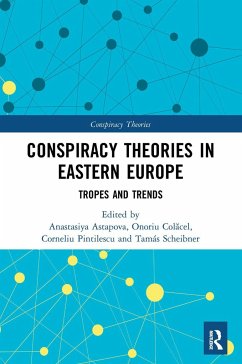This collection of state-of-the-art essays explores conspiracy cultures in post-socialist Eastern Europe, ranging from the nineteenth century to contemporary manifestations.
Conspiracy theories about Freemasons, Communists and Jews, about the Chernobyl disaster, and about George Soros and the globalist elite have been particularly influential in Eastern Europe, but they have also been among the most prominent worldwide. This volume explores such conspiracy theories in the context of local Eastern European histories and discourses. The chapters identify four major factors that have influenced cultures of conspiracy in Eastern Europe: nationalism (including ethnocentrism and antisemitism), the socialist past, the transition period, and globalization. The research focuses on the impact of imperial legacies, nation-building, and the Cold War in the creation of conspiracy theories in Eastern Europe; the effects of the fall of the Iron Curtain and conspiracism in a new democratic setting; and manifestations of viral conspiracy theories in contemporary Eastern Europe and their worldwide circulation with the global rise of populism. Bringing together a diverse landscape of Eastern European conspiracism that is a result of repeated exchange with the "West," the book includes case studies that examine the history, legacy, and impact of conspiracy cultures of Bulgaria, Estonia, Hungary, Moldova, Poland, Romania, Russia, Slovakia, Ukraine, the former Yugoslav countries, and the former Soviet Union.
The book will appeal to scholars and students of conspiracy theories, as well as those in the areas of political science, area studies, media studies, cultural studies, psychology, philosophy, and history, among others. Politicians, educators, and journalists will find this book a useful resource in countering disinformation in and about the region.
Conspiracy theories about Freemasons, Communists and Jews, about the Chernobyl disaster, and about George Soros and the globalist elite have been particularly influential in Eastern Europe, but they have also been among the most prominent worldwide. This volume explores such conspiracy theories in the context of local Eastern European histories and discourses. The chapters identify four major factors that have influenced cultures of conspiracy in Eastern Europe: nationalism (including ethnocentrism and antisemitism), the socialist past, the transition period, and globalization. The research focuses on the impact of imperial legacies, nation-building, and the Cold War in the creation of conspiracy theories in Eastern Europe; the effects of the fall of the Iron Curtain and conspiracism in a new democratic setting; and manifestations of viral conspiracy theories in contemporary Eastern Europe and their worldwide circulation with the global rise of populism. Bringing together a diverse landscape of Eastern European conspiracism that is a result of repeated exchange with the "West," the book includes case studies that examine the history, legacy, and impact of conspiracy cultures of Bulgaria, Estonia, Hungary, Moldova, Poland, Romania, Russia, Slovakia, Ukraine, the former Yugoslav countries, and the former Soviet Union.
The book will appeal to scholars and students of conspiracy theories, as well as those in the areas of political science, area studies, media studies, cultural studies, psychology, philosophy, and history, among others. Politicians, educators, and journalists will find this book a useful resource in countering disinformation in and about the region.








